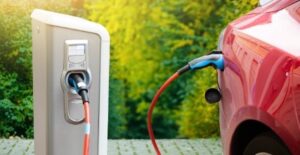By Ephraim Ofori NUMOSUOR
The global shift towards green energy is rapidly transforming industries, with the automotive sector at the forefront.
As electric vehicles (EVs) become the preferred alternative to fossil fuel-powered cars, the question remains: How fast will EVs penetrate the Ghanaian market?
By analysing past technological revolutions in Ghana and the current state of the green transition, we can better understand the future of EV adoption in the country.
Lessons from past technology revolutions in Ghana
Historically, the rate of technological adoption in Ghana has varied depending on infrastructure, government policies, and market readiness. Consider the following examples:
- Mobile phones and internet: In the early 2000s, mobile phone penetration in Ghana was slow, but once affordability and accessibility improved, adoption skyrocketed. Today, Ghana has over 40 million mobile subscriptions, exceeding its population.
- Mobile money: Initially met with skepticism, mobile money quickly became a dominant financial tool due to the unbanked population’s need for convenient transactions. Now, mobile money transactions exceed GH¢1 trillion annually.
- Solar energy: Despite the abundant sunlight, solar energy adoption has been slow due to high initial costs and inadequate policy incentives. However, increasing awareness and government support are driving growth in this sector.
Given these historical patterns, EV adoption in Ghana will likely follow a similar trajectory, slow at first due to cost and infrastructure challenges, but with the right policies and incentives, rapid growth could follow.

The state of EV adoption in Ghana
Currently, EV adoption in Ghana is minimal, largely due to:
- High initial costs: The average EV price is significantly higher than traditional fuel-powered vehicles.
- Lack of charging infrastructure: There are few public charging stations, making long-distance travel impractical.
- Limited public awareness: Many Ghanaians remain unfamiliar with the benefits of EVs.
- Dependence on fuel imports: Ghana’s existing fuel distribution network makes a transition to EVs disruptive for oil marketing companies (OMCs).
How Ghana can position itself for the green transition
To maximize the benefits of the EV revolution, Ghana should:
- Invest in EV infrastructure
- Establish nationwide charging stations, especially in urban centers.
- Promote solar-powered charging stations to reduce electricity costs.
- Provide incentives for EV adoption
- Offer tax breaks and import duty reductions on EVs.
- Support local assembly plants to lower costs and create jobs.
- Encourage public transport electrification
- Electrify taxis, tro-tros, and buses to accelerate adoption at the mass level.
- Provide financing schemes to help transport operators transition to EVs.
- Promote research and development
- Partner with universities and the private sector to develop affordable EV technology tailored to Ghana’s conditions.
- Explore local battery production and recycling initiatives to reduce reliance on imports.
Impact on Oil Marketing Companies (OMCs)
OMCs, which rely heavily on fuel sales, must rethink their business models. The shift towards EVs presents both challenges and opportunities:
Merits for OMCs:
- Diversification: OMCs can invest in EV charging stations, becoming key players in the new energy ecosystem.
- Sustainable growth: Reducing reliance on fuel sales will future-proof the business against global energy transitions.
Demerits for OMCs:
- Revenue loss: Reduced fuel demand will impact sales and profitability.
- Infrastructure shift: Retrofitting fuel stations to include EV charging requires significant investment.
What OMCs should do now
- Start investing in EV charging infrastructure: OMCs should gradually introduce charging stations at existing fuel stations.
- Explore renewable energy partnerships: Collaborations with solar and hydroelectric companies will ensure sustainable power for EV charging stations.
- Diversify product offerings: OMCs can expand into battery swapping services and energy solutions for EV users.
Conclusion
In Conclusion, While EV adoption in Ghana may take time, historical trends show that once affordability and infrastructure barriers are overcome, rapid adoption follows. By positioning itself strategically, Ghana can not only benefit from the green transition but also lead in West Africa’s EV market.
OMCs must adapt early to avoid obsolescence and tap into emerging opportunities. The transition is inevitable, whether Ghana chooses to lead or lag behind is a matter of proactive policy and investment decisions today.
>>>the writer is a Financial Economist | Research & Policy Analyst and can be reached via 0248803710 and or [email protected]










